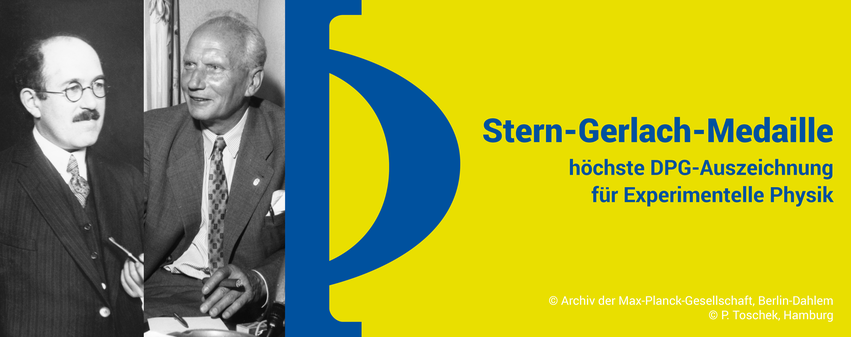Stern-Gerlach Medal
The Stern-Gerlach Medal is the highest award of the DPG for outstanding achievements in the field of experimental physics. It is awarded for work from the entire field of physics. The Stern-Gerlach Medal was established as a prize by the DPG in 1986 and was converted into a medal in 1992. The award consists of a gold medal with portraits of Otto Stern and Walther Gerlach and a certificate handwritten on parchment.
⇒ Stern-Gerlach Medal laureates
⇒ Playlist: Stern-Gerlach Medal Laureate Lectures and Interviews on the DPG YouTube Channel (external)
Statutes of the Stern Gerlach Medal
- The German Physical Society (DPG) can award the Stern Gerlach Medal for Experimental Physics once a year. It is the highest award of the DPG (besides the Max Planck Medal awarded for work in theoretical physics).
- The prize consists of a medal and a certificate containing the award text and a short laudation.
- The prize is announced annually (e.g. in the Physik Journal and/or on the DPG website). The management of the DPG, in agreement with the prize committee, announces the prize in good time and sets a deadline for the submission of nominations. The nomination proposals, which are forwarded by the office to the chair of the prize committee, must contain a detailed justification, a short laudation, a curriculum vitae, a list of publications, if applicable, and suggestions for reviewers. Self-nominations are not permitted.
- The medal serves to honour one or more outstanding experimental works from the entire field of physics. As a rule, the prize is awarded to one person at a time. If several persons are equally involved in the work, the award may be granted jointly.
- For the selection of the prize winners, a prize committee is formed consisting of eight persons who should cover the entire field of experimental physics and are nominated by the DPG Executive Board for a term of three years. Re-election is possible once. After retirement, re-election is possible at the earliest six years after retirement from the prize committee. In addition, the responsible DPG Executive Board member for Scientific Programmes and Prizes is an ex officio member of the Award Committee.
- The Award Committee elects a Chairperson and Vice-Chairperson from among its members.
- The Award Committee may adopt its own rules of procedure.
- The Award Committee shall meet at least once a year (on 'Tag der DPG') to discuss the proposals. The Prize Committee constitutes a quorum if at least half of its members participate. The Committee shall make its selection by a simple majority of its members; in the event of a tie, the Chairperson shall have the casting vote. The committee submits one or more award proposals to the DPG Executive Board, together with a statement of reasons and a laudatory speech suitable for printing.
- The Award Committee may obtain (external) expert opinions on the submitted proposals and, in addition to the nominations received, may also consider proposals from the previous year. The Award Committee may not make any nominations of its own.
- The DPG Secretariat supports the Award Committee in its work.
- The DPG Executive Committee decides on the awarding of the prize. If the prize committee does not submit a proposal in time, the prize will not be awarded in the period concerned.
- The award is preferably presented at a (larger) conference of the DPG. A lecture by the prize winner should take place within the framework of the same conference or a more suitable conference of the DPG.
- These statutes were adopted by the DPG Executive Board on 10 November 2012 and can only be amended by the Executive Board.
